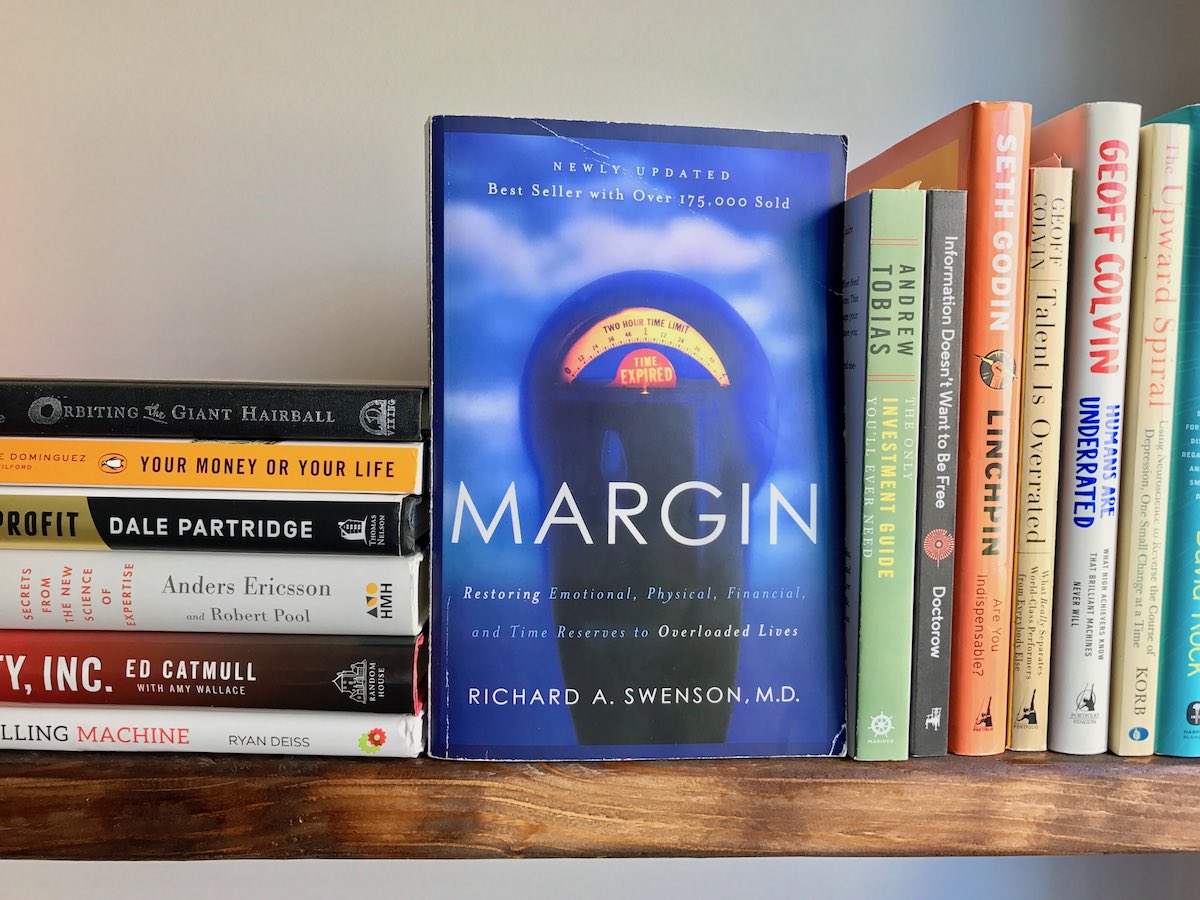Margin
Focus Club: Book Review
By Richard A. Swenson, M.D.
Margin is all about getting breathing room. It’s about being intentional about moving your life in the opposite direction of overload. In our always-connected, always distracted environments, this is such a critical message.
Having breathing room in your schedule, finances, emotional energy, and mental energy is paramount.
When you’re at capacity, there is no room for anything else. But when there is space left over — when there is margin — that space enables you to breath.
Having margin in your life enables you to do your best creative work. Margin enables intentional living and helps with stress and anxiety.
You can buy the book here:
For more resources on the topic of margin, click here.
Some of our favorite quotes from the book.
- No one likes pain. We all want to get rid of it as soon as possible. But physical pains are usually there for a reason, to tell us something is wrong and needs to be fixed. Emotional, relational, and societal pains, too, are often indicators that all is not well. As such, they serve a valuable purpose—they help us focus. Modern-day living, however, opposes focusing. (pg. 17)
- Food plus health plus warmth plus education plus affluence have not quite equaled Utopia. We live with unprecedented wealth and all it brings. We have leisure, entertainment, convenience, and comfort. We have insulated ourselves from the unpredictable ravages of nature. Yet stress, frustration, and oftentimes even despair unexpectedly accompany our unrivaled prosperity. (pg. 22)
- We must have some room to breathe. We need freedom to think and permission to heal. Our relationships are being starved to death by velocity. No one has the time to listen, let alone love. Our children lay wounded on the ground, run over by our high-speed good intentions. (pg. 27)
- As we subjugate progress, we first make it subservient to our greater goals and needs, especially relationships. We once again practice economics “as if people mattered.” We once again agree that things do not own us and are not even very important. We once again assert that jobs are only jobs, that cars are only organized piles of metal, that houses will one day fall down—but that people are important beyond description. We once again assert that love stands supreme above all other forces, even to the ends of the universe and beyond. (pg. 29)
- Until we find ways to guard our mental and spiritual health as well as our social ecology, we will only compound our troubles. (pg. 30)
- The circumstances of our age are quantitatively different from anything previously encountered, and the dramatic nature of this difference is consistently underestimated. (pg. 41)
- Whatever happened to margin? It was steamrolled by history. As noted, progress is a saboteur of margin. While margin can usually be counted upon to stay in one place, progress is always on the move—otherwise it would not be progress. (pg. 42)
- Four out of five Americans report a need to reduce stress in their lives. (pg. 43)
- Proper physical work, even if strenuous, does not absorb a great deal of the power of attention, but mental work does; so that there is no attention left over for the spiritual things that really matter. It is obviously much easier for a hard-working peasant to keep his mind attuned to the divine than for a strained office worker. (pg. 46-47)
- Overloading occurs whenever the requirements upon us exceed that which we are able to bear. For example, camels are able to carry great loads. If, however, a straw is placed on a camel maximally loaded down, its back will be broken. The back is not broken by the straw; it was broken by overload. (pg. 54)
- We must learn to accept the finality and nonnegotiability of the twenty-four-hour day. (pg. 65)
- For if today margin is useful, tomorrow it will be urgent. If today valuable, tomorrow it will be essential. (pg. 69)
- Margin grants freedom and permits rest. (pg. 69)
- If starving or thirsty, we needn’t be told that food or water is what we lack. If sleep-deprived, we needn’t be told that sleep is what we yearn for. If exhausted from a thirty-mile walk, we needn’t be told that rest is what our body craves. If bankrupt, we needn’t be told that money is what we require. Why, then, when we so desperately need margin in our lives, is it necessary to explain our need for it? Why don’t we understand it by instinct? (pg. 71)
- Just as stress and change are related, so margin and load are related. But margin did not appear on our pain agenda until a certain threshold was reached, namely until the “more and more of everything faster and faster” of progress collided with human limits. At precisely that point, load became overload. And, at the same moment, our margin disappeared. (pg. 72)
- Of the four margins—emotional energy, physical energy, time, and finances—margin in emotional energy is paramount. When we are emotionally resilient, we can confront our problems with a sense of hope and power. When our psychic reserves are depleted, however, we are seriously weakened. Emotional overload saps our strength, paralyzes our resolve, and maximizes our vulnerability, leaving the door open for even further margin erosion. (pg. 79)
- What happens when our emotional energy reserves are chronically depleted? “If we string ourselves out, expending 100 percent of our time and energy, there is no way in which we can adjust to the unexpected emergency,” concludes Pastor Louis H. Evans, Jr. “We become defensive about our expended energies because there isn’t anything left to give. Having nothing in reserve, we tune out the need.” Stuck in survival mode, there never seems to be enough strength for service. (pg. 81)
- The average American today gets two and one-half hours less sleep per night than 100 years ago. (pg. 96)
- One hundred percent of people who exercise to the point of cardiorespiratory fitness will experience an increased sense of well-being. Exercise has a tranquilizing effect on the body. It helps decompress stress and is good medicine for anxiety or depression. Along with increased energy, it grants increased alertness, independence, dignity, self-esteem, and sleep. (pg. 106)
- With fewer possessions, we do not have as many things to take care of. With a simpler wardrobe, our choice of what to wear each morning becomes less time-consuming. With a smaller estate, there will be less debt bondage in our work schedule. Everything we own owns us. We must maintain it, paint it, play with it, build space in our house to put it, and then work to pay it off. Perhaps if we had fewer things we might have more time… (pg. 124)
- By lowering expenses below income you live with far less stress and pressure. If the refrigerator breaks down, you don’t. If you car needs new tires, you simply go out and get them. Without margin, life struggles and staggers and stumbles. But when margin is present, life flows. And flowing is more enjoyable than staggering. (pg. 137)
- When we give money away, we not only neutralize its power over us, but we also bring it under the domain of the Kingdom of Light. Nongrace is turned into grace. God is honored, and His lordship is confirmed. (pg. 140)
- Living within your harvest is possible—it just isn’t popular. (pg. 141)
- Contentment and simplicity are invaluable friends. (pg. 141)
- Money does seem to meet our needs in the short term. It buys us food, shelter, vehicles, and experiences. It does not, however, meet any of our deeper long-term needs: love, truth, relationship, redemption. (pg. 162)
- God is what we need; things are what we use. (pg. 164)
- Simplicity sets the imagination free to work and to enjoy. (pg. 173)
- Simplicity recognizes the importance of margin and seeks to protect it. (pg. 173)
- Restraint is necessary for successful living, and all the more for simple living. (pg. 173-174)
- While undivided devotion to one cause can bring great success and vault a person into prominence, such a priority structure often leaves the rest of that person’s life in a state of disorder. (pg. 185)
- Our rush toward excellence in one quadrant of life must not be permitted to cause destruction in another. (pg. 185)
- If you wish to achieve excellence but also to have life balance, beware. Those who advocate excellence at all costs often do not believe in “outside interests” and may not tolerate them. Family, friends, church, as well as margin in personal time and emotional health—all are luxuries that may compete with a stellar performance in a single area. If, then, we are forced to choose between excellence and balance, how do we choose? (pg. 187)
- If stress crushes your spirit by poisoning you with despair, then either conquer stress or walk away—but don’t stop relating. If overload destroys your relationships, then dispatch overload to the far side. If that malignant, universal enemy of relational health, marginless living, leaves you panting for air and desperate for space, then go and take margin back. Hack it out of your cultural landscape. And guard it for the sake of your God, yourself, your family, and your friends. (pg. 214)
Nice work, !
Congrats on doing today’s assignment.
